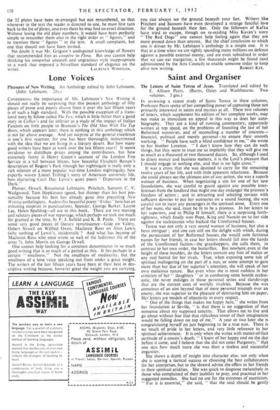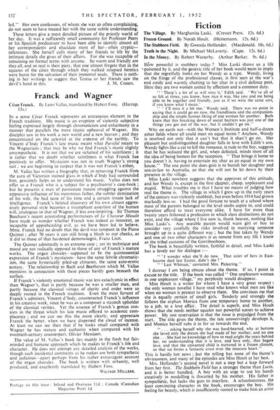Saint and Organiser
IN reviewing a recent study of Santa Teresa in these columns, Professor Peers spoke of her compelling power of capturing those not primarily interested in saints and mystics at all. These two volumes of letters, which supplement his edition of her complete works, may not make as immediate an appeal in this way as does her auto- biography. They are a kind of running commentary, apparently written at top speed, on the problems of founding the last of her Reformed nunneries, and of reconciling a number of' interests— financial, political and merely personal—to ensure their smooth working. " People have such a blind confidence in me," she wrote to her brother Lorenzo. " I don't know how they can do such things, but they seem to trust me so implicitly that they will give me as much as a thousand or two thousand ducats. So, although I used to detest money- and business matters, it is the Lord's pleasure that I should engage in nothing else, and that is no light cross." .
It was a cross that she was destined to carry for the remaining twelve years of her life, and with little apparent reluctance. Because she could always see the ultimate aim of any action, she was a superb woman of business. When negotiating a site for one of her new foundations, she was careful to guard against any possible inter- ferences from the landlord that might one thy endanger the prioress's freedom of action ; and in attracting and selecting novices with sufficient dowries to put her nunneries on a sound footing, she was careful not to incur any passengers in the spiritual sense. Every one of her nuns, she said, must be fit to be a prioress. In her letters to her superiors, and to Philip II himself, there is a surprising forth- rightness, which finally won Pope, King and Nuncio on to her side against the ecclesiastics who backed the Unreformed houses.
Teresa was not only a very sound woman of business, but also a born intriguer ; and one can still see the delight with which, during the persecution of her Reformed houses, she would coin fictitious names for her friends, in case her letters should fall into the hands of the Unreformed faction—the grasshoppers, she calls them, in contrast to her own order, the butterflies. But nowhere, even at the height of these troubles, do the letters contain any hint of malice or any real hatred for her rivals. True, when exposing some tale of spiritual malingering on the part of a nun, or some attempt to gain more than her due of her superior's attention, she will speak of her own malicious nature. But even when she is most ruthless in her criticism of her " daughters " or in combating &rime hostile ecclesi- astic, she never indulges in those personal spites and slanderings that are the current coin of worldly rivalries. Because she was conscious of an aim beyond that of mere personal triumph over an enemy, she was superior to the pleasure of destroying him on paper. Her letters are models of objectivity in every respect.
" One of the things that makes me happy here," she writes from her foundation at Seville, " is that there is no suggestion of that nonsense about my supposed sanctity. That allows me to live and go about without fear that that ridiculous tower of their imagination would be falling down on top of me." A year or two later she is congratulating herself on just beginning to be a true nun. There is no touch of pride in her letters, and very little reference to her spiritual achievement. It is only when she writes with matter-of-fact certitude of a cousin's death, " I knew of her happy end on the day before it came, and I believe that she did not enter Purgatory," that one sees how much more she was than a tireless and successful organiser.
She shows a depth of insight into character also, not only when she is scoring a tactical success or choosing the best collaborators for her enterprises, but in the shrewd advice she offers to her friends in their spiritual aridities. She was quick to diagnose melancholy in those who complained of their inability to pray, and practical in her suggested remedies. She had no use for the extremes of asceticism. " For it is essential," she said, " that the soul should be gently led." Her own confessors, of whom she was so often complaining, do not seem to have treated her with the same subtle understanding.
These letters give a most detailed picture of the priestly world of her day. It was a sufficiently small community for Professor Peers or his Spanish .predecessor to have been able to identify almost all her correspondents and elucidate most of her—often cryptic— references. She herself calls many of her friends to life by the intimate details she gives of their affairs. For she was incapable of remaining on formal terms with anyone. So warm and friendly are they all, and so real is their piety, that one almost forgets that in the squares of the cities through which they walked relapsed heretics were burnt for the salvation of their immortal souls. There is noth- ing in her writings to suggest that Teresa or her friends saw the



































 Previous page
Previous page